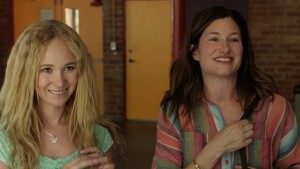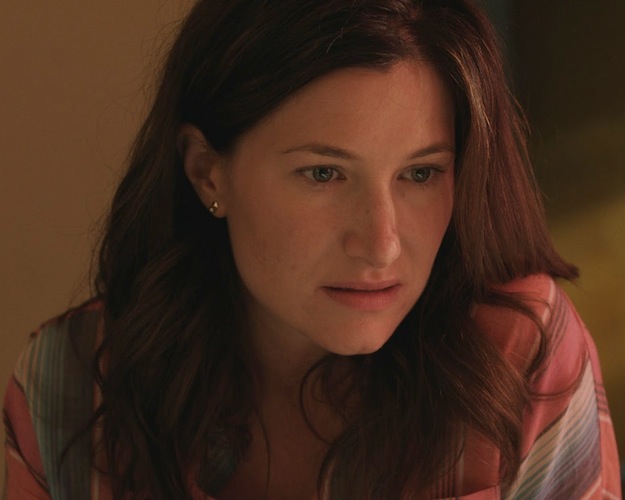Movie Review: A Surprisingly Intelligent “Afternoon Delight”
We’ve heard all these gripes before, in life, in books, on TV, and in piles of movies. But Kathryn Hahn, a newcomer to me, is so enthralling and right that Rachel’s alienation, her poor little rich girl suffering, feel harsh and real. And her unfocussed anger. Even in Silver Lake, life is a cheat.
Afternoon Delight, directed by Jill Soloway. At cinemas throughout New England.
By Gerald Peary
Bored housewife befriends a stripper and takes her in” is the unpromising gimmicky premise of the independent feature, Afternoon Delight. So what a surprise when this first film from writer-director Jill Soloway, who has a history in theatre and TV, turns out to be one the most intelligent, appealing movies of 2013. For a start, the sensationalist adopt-a-stripper plot line makes sense, what the desperately confused heroine of the movie just might do, in an attempt to shake up, and subconsciously muck up, her listless, quietly desperate life.
The setting of Afternoon Delight is Silver Lake, that wealthy, liberal, vaguely bohemian enclave of LA, a utopia for those who want to be grounded and real, away from Hollywood glitz. But in several-million-dollar homes. There reside Rachel (Kathryn Hahn) and Jeff (Josh Radnor), with a curly-haired son and a swimming pool, Jewish thirtysomethings in enviable luxury. He has made a quick Internet fortune inventing popular apps, and she doesn’t need to be a breadwinner. And yet, for Rachel, where’s the payoff?
“I’m not a woman living in Darfur,” Rachel explains, guiltily, to her therapist, Dr. Lenore (Jane Lynch), cognizant of her privilege. She doesn’t carry water in a jug on her head. She doesn’t get raped, she says, trekking back and forth from a faraway water hole. But she is so so discontented. Rachel dreamed of being a journalist, a war correspondent. However, she has no profession beyond wife and mother. She’s sick of her women friends, who mirror her in their indolence. She and her husband pass each other most days, as Jeff’s checking his cell phone, absorbed in work. And when he’s off work, he gets his deepest pleasure hanging out with the guys doing stereotyped male things: surfing, kibitzing over poker.
And their sex life is the pits. That’s Rachel’s complaint to Dr. Lenore. She and Jeff have lost their lustful feeling.
We’ve heard all these gripes before, in life, in books, on TV, and in piles of movies. But Kathryn Hahn, a newcomer to me, is so enthralling and right that Rachel’s alienation, her poor little rich girl suffering, feel harsh and real. And her unfocussed anger. Even in Silver Lake, life is a cheat.
So here comes the stripper.Rachel has no panacea for her existential malaise. (There isn’t any, folks.) But she grabs at one manifestation of her gloom, her faltering libido. Maybe her horniness could return somehow, if she and husband visited a gentleman’s club? And there, though he personally finds strippers more sad than sexy, courtly Jeff pays for a lap dance — not for him but for his wife. At that moment, Afternoon Delight sheds its façade of being a bourgeois comedy. In a curtained back room, things get sensual and sexual, as a blonde, unclothed young thing crawls all over Rachel, and looks deeply into Rachel’s suddenly dewy eyes.
Can we assume that Jill Soloway has seen and studied Belle de Jour? That’s the 1967 Luis Buñuel classic about the rich, beautiful young wife (Catherine Deneuve) who takes an afternoon job as a high-class prostitute in a bordello. Similarly, Rachel becomes transfixed by the adult dancer XXX existence. To the horror of Jeff, she traces down the seductive stripper, McKenna (Juno Temple), and moves her into the spare bedroom. Rachel’s claim is that she wishes to save McKenna from a messy personal life. The reality is that she’s mesmerized by this sexually bold young lady, and even more when McKenna reveals that she’s a sex worker with regular clients.
Without telling Jeff, Rachel agrees to tag along on one of McKenna’s paid trysts, at a john’s private apartment. A great transgressive scene ensues, funny and uncomfortable and then creepy and uncomfortable, as an embarrassed, fish-out-of-water, Rachel is appointed, in the bedroom, as the designated voyeur. Things heat up. The john—barrel-chested, hairy-chested — demands to hold Rachel’s hand while McKenna grinds on top of him. Suddenly, he sticks Rachel’s finger into his mouth, and greedily sucks on it as he explodes in orgasm! Gross, gross, gross, this almost ménage a trois.
Rachel’s romance with the wild side deflates. McKenna feels dirty to her. And she feels dirty herself. Defiled. Another potent scene: Rachel gets drunker and drunker at a Woman and Wine party with her Silver Lake friends, and finally self-destructs, screaming out a sad, sad story of her freshman-year abortion, of a year wasted afterward, watching soap operas on her mother’s couch. At a formative time, she was a lost college dropout.
Has Rachel ever recovered?
Thankfully for the credibility of Afternoon Delight, filmmaker Solway absents her hooker from the requisite heart of gold. As with most non-movie prostitutes, pretty woman McKenna is a damaged person who, as a result, is capable of inflicting damage. She tries to wreck Rachel and Jeff. But the most harm is done by Rachel herself. “I’m sorry I threw a bomb at our marriage,” she will meekly tell her estranged husband.
May I say that the well-meaning ending of Afternoon Delight (I can’t tell you what happens) is only fairly convincing? But let’s forgive Jill Soloway because of two wonderful scenes near the movie’s climax. One involves an unexpected breakdown of Jane Lynch’s lesbian therapist, a most touching cry for help; and the other is a sudden Jewish moment — a glimmer of hope, forgiveness, reconciliation — in which candles are lit for Shabbat. In a dusty man-cave garage.
Gerald Peary is a professor at Suffolk University, Boston, curator of the Boston University Cinematheque, and the general editor of the “Conversations with Filmmakers” series from the University Press of Mississippi. A critic for the late Boston Phoenix, he is the author of 9 books on cinema, writer-director of the documentary For the Love of Movies: the Story of American Film Criticism, and a featured actor in the 2013 independent narrative Computer Chess.



Needs a job.